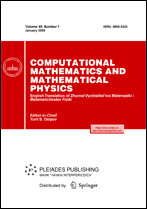|
This article is cited in 28 scientific papers (total in 28 papers)
A randomized algorithm for two-cluster partition of a set of vectors
A. V. Kel'manovab, V. I. Khandeeva
a Sobolev Institute of Mathematics, Siberian Branch, Russian Academy of Sciences, pr. Akademika Koptyuga 4, Novosibirsk, 630090, Russia
b Novosibirsk State University, ul. Pirogova 2, Novosibirsk, 630090, Russia
Abstract:
A randomized algorithm is substantiated for the strongly NP-hard problem of partitioning a finite set of vectors of Euclidean space into two clusters of given sizes according to the minimum-of-the sum-of-squared-distances criterion. It is assumed that the centroid of one of the clusters is to be optimized and is determined as the mean value over all vectors in this cluster. The centroid of the other cluster is fixed at the origin. For an established parameter value, the algorithm finds an approximate solution of the problem in time that is linear in the space dimension and the input size of the problem for given values of the relative error and failure probability. The conditions are established under which the algorithm is asymptotically exact and runs in time that is linear in the space dimension and quadratic in the input size of the problem.
Key words:
partition, set of vectors, squared Euclidean distances, NP-hardness, randomized algorithm, asymptotic accuracy.
Received: 12.03.2014
Citation:
A. V. Kel'manov, V. I. Khandeev, “A randomized algorithm for two-cluster partition of a set of vectors”, Zh. Vychisl. Mat. Mat. Fiz., 55:2 (2015), 335–344; Comput. Math. Math. Phys., 55:2 (2015), 330–339
Linking options:
https://www.mathnet.ru/eng/zvmmf10162 https://www.mathnet.ru/eng/zvmmf/v55/i2/p335
|


|





 Contact us:
Contact us: Terms of Use
Terms of Use
 Registration to the website
Registration to the website Logotypes
Logotypes








 Citation in format
Citation in format 
